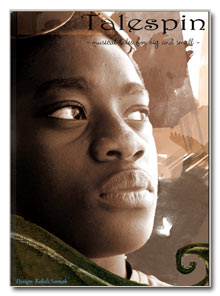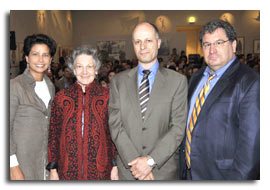Wednesday, 22 April 2009
Leopold Museum
Museumsquartier
 Open Sesame! -- Iftah ya Sim-sim! -- Sesam Öffne Dich!
Open Sesame! -- Iftah ya Sim-sim! -- Sesam Öffne Dich!A live performance of "Ali Baba and the Forty Thieves", featuring the "Elevenchor" of the Vienna Boys' Choir and the "Talespin" ensemble, formed the centrepiece of the Kick-Off event for a unique project on "Mother Tongue and Cultural Identity" which took place at the Leopold Museum in Vienna on 22 April. Under the patronage of UNIS Vienna, the Vienna School Board (Stadtschulrat) and the Vienna International School, and with support from the City of Vienna, the U.S. Embassy Vienna, and Leopold Museum, the project invites students aged 10-18 to submit an original work of art (music, performance, literature, or fine art) that expresses the author's mother tongue and cultural identity. The project will culminate in a Gala event in February 2010 to coincide with International Mother Language Day.
"Talespin" was inspired by the English notion of "spinning a tale" and combines traditional folk tales from around the world with original music and art in live performances. "Talespin" enjoys discovering and "Talespinning" stories from all over the world. Stories are reflections of the hopes and values of every culture and reveal human characteristics shared by all. The tale featured at this particular event -- Ali Baba and the Forty Thieves -- with an original score my Jason Gray (USA) and illustrations by Rima Al-Juburi (Iraq/Austria) includes a notion of the power and magic of language, epitomized by the universally known command "Open Sesame!"
 The theme of the evening and of the project was introduced by UNIS Vienna Director Maher Nasser who said: "Traditionally, folk tales and stories played an important role in the life of a community. They were used both to entertain and to educate young and old, to teach particularly children about the community's traditions and values. [...] Times have moved on since - we now live in the information age where theatre, opera, movies, television, and in the internet have taken over the traditional function of conveying important cultural information and messages. The function of storytelling has not changed, just the media have. All these media are potential vehicles for reinforcing important messages of ethics and the necessity to respect human rights -- important messages that are enshrined in the United Nations charter and in the Universal Declaration of Human Rights."
The theme of the evening and of the project was introduced by UNIS Vienna Director Maher Nasser who said: "Traditionally, folk tales and stories played an important role in the life of a community. They were used both to entertain and to educate young and old, to teach particularly children about the community's traditions and values. [...] Times have moved on since - we now live in the information age where theatre, opera, movies, television, and in the internet have taken over the traditional function of conveying important cultural information and messages. The function of storytelling has not changed, just the media have. All these media are potential vehicles for reinforcing important messages of ethics and the necessity to respect human rights -- important messages that are enshrined in the United Nations charter and in the Universal Declaration of Human Rights."
Speaking on behalf of the Vienna School Board, Inspector for Music Ferdinand Breitschopf spoke of the central role played by music (as the universal language) in conveying cultural information and in defining identities -- both collective and individual. "Finding oneself, one's own cultural identity, seeking answers to the enternal question "who am I?" are important issues in the life of any young person between the ages of 12 and 16 and the source of much confusion." And music can play a key part on the road to that personal discovery.
 The project is open to all Vienna schools and aims to allow students to develop their understanding of their own cultural identity, as well as honouring that of others. Throughout the project there will be a strong focus not just on the finished work, but on the process of discovery and learning with support from the organizers. Students are invited to reflect on who they are and then encouraged to express themselves in a variety of media: in an original piece of music or dance, in a piece of art, or by writing. Both individual and group projects will be accepted and all submissions will be exhibited at the end of the project, with three pieces to be perfomed live at the final Gala event.
The project is open to all Vienna schools and aims to allow students to develop their understanding of their own cultural identity, as well as honouring that of others. Throughout the project there will be a strong focus not just on the finished work, but on the process of discovery and learning with support from the organizers. Students are invited to reflect on who they are and then encouraged to express themselves in a variety of media: in an original piece of music or dance, in a piece of art, or by writing. Both individual and group projects will be accepted and all submissions will be exhibited at the end of the project, with three pieces to be perfomed live at the final Gala event.
UNIS Vienna is offering active support to the project, in the context of the Creative Communities Outreach Initiative, spearheaded by DPI in New York. By reaching out to and engaging the creative community -- television, film, the arts, etc. -- United Nations entities are able to reach new and different segments of society with messages of the importance of tolerance, human rights and cultural diversity.
For more information on Talespin and the project, please see www.talespin.eu
Invitation (PDF)